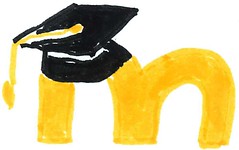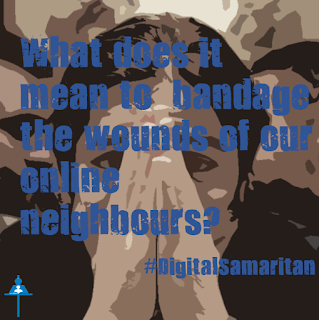I am a Project-based Learner
One of the things I love about taking a Courosbrandt class is the opportunity to directly apply learning to a project. It is one of the things that makes learning for me all the more relevant and authentic. By being able to directly apply my learning to something that students other colleagues can benefit from makes everything feel all the more authentic ... Not that writing a paper isn't worthwhile, but projects are definitely, how can I put this, worthwhile. And when I think about it, perhaps this is one more reason to be an advocate of project-based learning. For the learner there has to be that authentic, real-life perspective.Enough Stalling... What's the Plan?
My Goal: Create a grade 7/8 Digital Citizenship blended course via Moodle. I intend on using the same platform as the RCSD Learning Online department in order to provide middle years students an experience using the same digital platform that they may explore as they enter high school. I could choose to use another platform, but basically I see this as an opportunity to get students comfortable navigating and interacting on that platform. In choosing to use Moodle, there are some challenges that I may encounter, one being the rigid structure from which it is designed. And the second, having to train myself to use this system. Quite honestly, using Moodle will definitely stretch my skills. Ugh.
Course Details: The course will examine a faith-based perspective of Digital Citizenship for seventh and eighth grade students, and will take approximately 20 hours to complete, depending on the implementation preferences of the teacher. Meaning, teachers are encouraged to integrate this course cross-curricularly to allow for a more enriching experience from online to face-to-face discussion and artifact sharing. If you are wondering, why faith-based digital citizenship? Yes, I have wondered that many time myself...and been questioned on this perspective. So here is my rationale that I wrote for another project... Why Faith-Based Digital citizenship?
Although the course will focus on integrating Ribble's Nine Elements and the Saskatchewan Digital Citizenship Continuum, lessons will be cross-curricular in nature with a strong-focus on Religion, ELA, Health and Social Studies. However the course itself will be integrated into the Practical and Applied Arts curriculum and will be implemented during this time in the schedule. This is a good fit because PAA at the grade 7/8 level states, "Students entering grade seven will be required to take at least three Practical and Applied Arts (PAA) survey courses before completing grade nine." The PAA curriculum also states that, "Appropriate safety concepts should be integrated throughout survey courses." Digital Citizenship seems to be a good fit for a survey course, being that the focus of digital citizenship is to teach students how to become ethical and responsible citizens as they learn how interact online safely while nurturing a positive digital footprint.
 |
| "baseball diamond" (CC BY-NC 2.0) by dan_moves |
 |
| "moodle" (CC BY 2.0) by o.tacke |
Audience/users: The course will be for teachers and grade 7/8 students within the Regina Catholic School Division (RCSD).
For those of you wondering what about grade K-6? The Grade 1-6 students have a course which incorporates the integration of technology and faith in a digital citizenship project that was created last year by myself and a team of teachers titled, "Samaritans on the Digital Road".
Implementation Goals:
Teachers will be responsible for the majority of the assessments of students, with a combination of self and peer-assessment within the course, as well as quick formative assessments that are marked by the learning management system (LMS). Therefore teachers will also need training on how to nurture online interaction and discussions. Instructions in how to do so will be provided as part of the teacher documentation for the course.
Number of Modules:
12 modules-ish...
1. Introduction module - Introduce and explore essential question for students: "why a faith based approach to digital citizenship?" (If the teachers are wondering, so will the students...)
2. Modules 2-10 - Ribble's 9 Elements of Digital Citizenship. Incorporate essential question for the module, vocabulary, readings/videos from online sources, major activity allowing students to either blog and participate in a digital forum, create artifacts based on reflections of learning for that topic etc...
3. Module 11 will focus on a "Faith-based Digital Citizenship Service project for others". A great deal of brainstorming will occur face-to-face f2f, with opportunities for sharing and collaborating. Projects will not only be shared in school community but with the world - Think "pay it forward style". This will in turn help to spread the ideal, that we can help make the Internet a better place... and that to have a digital footprint is not just about calling attention to ourselves... It is about reaching out to the margins to those who are shunned, sharing positivity and social good, and preserving not only digital footprint but digital dignity.
4. Module 12 - Final summative Assessment, self and peer evaluation
Now you might be wondering... those are big plans Jenn, when do you intend on getting this all done? Next Christmas?? (Trust me I'm wondering this too). So here is the plan...
Group participants: Due to the very specific nature of this course and the Learning Management System LMS platform, I understand that I will be on my own as far as members from this class (unless anyone wants to join in of course). However, in order to get buy-in from teacher stake-holders, I plan on having a sub-committee of 2-3 teachers to share lesson ideas and engage in brainstorming. This committee will then also be part of my initial pilot of the course this spring. Due to the size of the course, and my learning of a new LMS platform with Moodle, I hope to also call upon a fellow coworker (Kyle Webb) to assist me with more of the technical aspects or help troubleshoot issues.
So that's it. Time to get started. I will be meeting with a couple teachers next week to get things rolling... and exploring Moodle.
If you have any suggestions or comments, please feel free to share them. I appreciate any feedback!



This is awesome! Very thorough at such an early point in the semester. I'm looking forward to seeing how your project ends up because we are doing the 9-12 focus for digital citizenship. We won't have the religious aspect of it, but I'm hoping there is some continuity between our project and yours.
ReplyDeleteFantastic Ashley! Perhaps we need to do some collaboration!
ReplyDeleteYour focus is already so clear! Looking forward to seeing it all come together.
ReplyDeleteI am sure that you will succeed in the near future. Such a project could be implemented thanks to the commitment. This service contact can be useful to you.
ReplyDelete